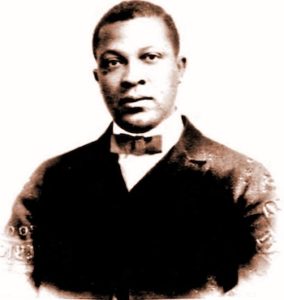
Joe Jordan
*Joe Jordan was born on this date in 1882. He was a Black pianist, composer, real estate investor, and music publisher.
Joseph Taylor Jordan was from Cincinnati, Ohio, grew up in St. Louis, Missouri, and received musical training at the Lincoln Institute (now Lincoln University) in Jefferson City, Missouri. 1900, as a young man, he performed as a fiddler and percussionist with Tom Turpin, Sam Patterson, and Louis Chauvin in a singing four-piano act. In 1902, he went to New York City to collaborate with Ernest Hogan, known in show business as "The Unbleached American."
At the beginning of the 20th century, much of the entertainment industry ran on exploiting non-white stereotypes. Hogan's big hit was called "All Coons Look Alike to Me," and the stage shows he and Jordan created was "Rufus Rastus." Another example of the general racial theme was "Dandy Coon", produced by Chauvin and Patterson in 1903. Jordan stage-managed and directed the music for this bit of minstrelsy, which toured with a cast of thirty, including a "beautiful octoroon chorus." When the show disbanded, Jordan left for Chicago. He began performing at the Pekin Theatre, a former casino/saloon at 27th and State.
Jordan commemorated this hot spot with the "Pekin Rag," published in 1904. He briefly returned to St. Louis to play the Faust Restaurant at the 1904 St. Louis World's Fair. Jordan returned to New York in 1905 to work with Ernest Hogan and James Reese Europe at organizing and directing the Memphis Students, a group of seventeen Black men and women who were not students, nor were they from Memphis. Later 1905, they played Paris, London, and other major European cities. Jordan composed "Rise and Shine," "Oh, Liza Lady," "Goin' to Exit," and "Dixie Land" for this group. He also wrote the "J.J.J. Rag." He conducted the 16-piece house orchestra and served as composer and musical director, all for a weekly salary of $25.
In New York, Jordan wrote some songs for Aida Overton Walker. Also, in 1909, Jordan collaborated with Bob Cole and J. Rosamond Johnson on The Red Moon. This Broadway operetta broke the Jim Crow convention by having persons of color perform serious romantic songs, expressing realistic human emotion. Serious black life was not permitted, especially outside New York City. In 1910, Jordan wrote "Lovie Joe" (no) for Fanny Brice. Barred as a black man from entering the theater where Brice premiered the song, Jordan stood outside on the pavement and heard the public demanding eight encores. Jordan went to Germany in 1911 with King and Bailey's Chocolate Drops. On his way back, he performed his way through England. Landing at the Pekin in Chicago again, he resumed his duties there for about three years.
His songs dating from this period include "Dat's Ma Honey Sho's Yo' Born," "Oh Say Wouldn't It Be a Dream," and "Brother-In-Law Dan." He did very well in Chicago's real estate market. In 1917, he built the J. Jordan Building Bronzeville neighborhood at 3529–49 South State Street, at the corner of 36th Street – described as the city's first significant commercial building by a black developer. 1918-19, he was assistant director and financial advisor for Will Marion Cook's New York Syncopated Orchestra.
1928 Jordan conducted Jabbo Smith, Garvin Bushell, James P. Johnson, and Thomas "Fats" Waller in the musical revue Keep Shufflin'. Jordan's touring band was called the Ten Sharps and Flats. He conducted the Federal Theatre Project's (FTP) Negro Unit Orchestra in New York during the 1930s. From April 14 to June 20, 1936, Jordan worked with Johnson, Porter Grainger, and Asadata Dafora, providing music for the FTP production of Shakespeare's Macbeth, directed by Orson Welles, at the New Lafayette Theatre. In 1939, Jordan led a symphony orchestra augmented by a 350-voice chorus at Carnegie Hall.
He collaborated with W. C. Handy, led military bands during World War II, and ran a successful real estate business in Tacoma, Washington, where he died on September 11, 1971.
To Become a musician or Singer.
To Become a Conductor or Composer